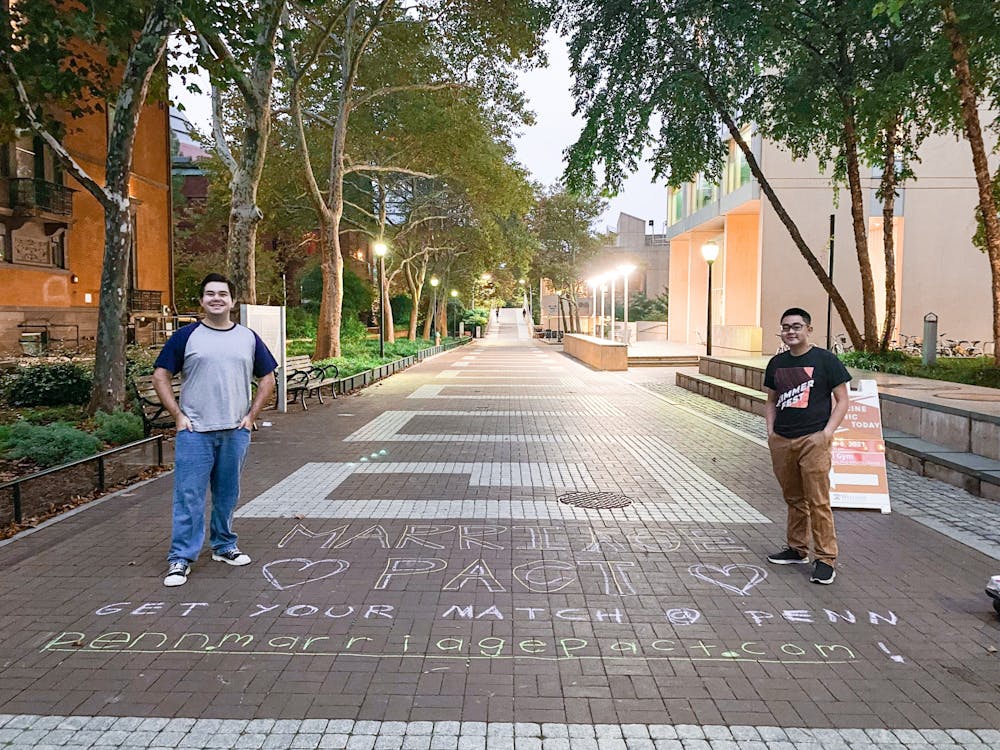Penn Marriage Pact, an algorithm-based service that matches students one-to-one to foster new friendships and relationships, is returning to Penn for a second time. This year, the 57-question form features new questions and an updated matching algorithm.
The form opened Oct. 4 and will close on Monday at midnight. Matches are tentatively scheduled to be released the day after, according to Wharton senior and Penn Marriage Pact organizer Lance Lunceford. The Marriage Pact system is currently at 55 different schools, including Stanford University, Princeton University, Yale University, and Duke University, and has facilitated 68,192 matches.
The deadline was extended from Oct. 10 to Oct. 11 to correct a "lopsided" matching pool with 671 more women than men in the "heterosexual marriage market." In an email sent on Oct. 10, the team said that they would extend the deadline by one day and encouraged students to invite their straight or bisexual male peers to sign up.
Penn Marriage Pact is organized by Lunceford, College senior Julia Esposito, and Wharton junior Derek Nhieu who promote the event and design the questionnaire. The form consists of sets of questions that survey the student’s demographics and personal ideas. Although most of the questions are kept consistent each year, new questions are added to “give a little bit of flair” to the survey, Lunceford said.
Some of the new prompts this year include: “I would go to space even if there was a chance I wouldn’t come back” and “violence is an acceptable form of protest.” Students rank their responses on a scale from one to seven based on how much they agree with the statement.
The team also handpicked school-specific questions, such as ones that ask about the “pre-professional atmosphere or different aspects of Penn’s culture,” Lunceford said. Other Penn-specific prompts include: “I keep some ‘friends’ here at Penn because they might be useful to me in the future” and “Are you smarter than most people at Penn?”
The new algorithm is based on student feedback, and will not focus more on matching people within their class year and relationship status.
The team brought Marriage Pact to Penn for the first time last March, in the midst of the COVID-19 pandemic, in hopes to foster new connections. This year, Nhieu said that the goal of Marriage Pact is the same but that he hopes this year people actually meet their match in person.
RELATED
Friend-matching app ‘Berri’ made by Penn students launches at all Ivy League schools
Two Penn students develop doodle-based dating app, buoyed by support from viral TikTok video
“We just want people to be connected to someone that they’re compatible with,” Nhieu said.
Lunceford echoed Nhieu’s sentiments, saying that he hoped the Marriage Pact could help students to create relationships at Penn, whether platonic and romantic.
“I think having someone who you're compatible with — whether it's a love, a romantic relationship, or just someone new — provides something so invaluable, especially considering these people probably wouldn’t meet if it wasn't for Marriage Pact,” Lunceford said.
Last semester, the choice and the wording of some of the questions in the survey sparked controversy. Some prompts that garnered criticism included: “Gender roles exist for a good reason,” “I would be disappointed if my partner gained weight,” and “I’m comfortable with my child being gay.”
In this year’s matching form, the questions were phrased in a “much more positive light,” Lunceford said.
The “LGBTQ+ stance” question was rephrased to say “I want to foster an LGBTQ+ positive household.” The question about weight was eliminated and replaced with “I pay attention to what I eat” and “Exercising is an important part of my identity.”
“We want to be body positive, but acknowledge that physical appearance is important to a lot of people,” Nhieu said.
Both Nhieu and Lunceford said that the inclusion of these sensitive questions, along with ideological questions like “I would keep a gun in the house” and “abortion should always be legal” serve to protect the users from a bad match.
“For example, the LGBTQ+ positive household question was included to protect the LGBTQ+ community, which some people disagree with, and other people appreciate,” Nhieu said.
Lunceford added that the inclusion of these questions not only prevents users from being mismatched, but they also are essential to “assessing for fundamental values” of the users.
“I would never normally ask someone [these questions] in a conversation, but if we want to foster a sense of deep connection, we have to go deep and ask these things," Lunceford said. "We’re trying to do this in a way that makes people comfortable and secure, to the best of our ability.”
The team agreed that they want to bring Marriage Pact back to Penn again in the future and to hopefully make a “casual tradition” out of it, according to Lunceford, who hopes to bring back Marriage Pact annually.
“Getting matched to someone who is super compatible to you as a friend or as a lover is really valuable," Nhieu said. "We’re basically using science to help establish better, deeper connections, and I think that’s really cool.”









